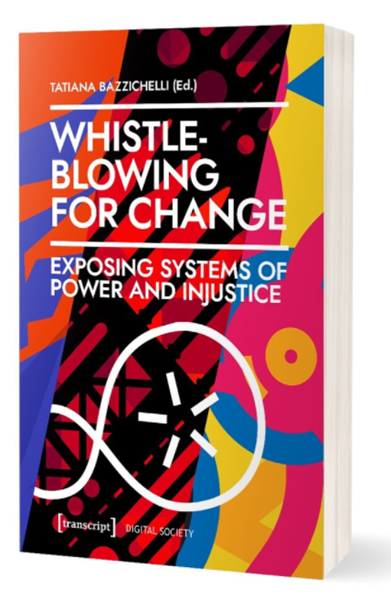Whistleblowing for Change - Disruption Network Lab, Berlin
24 November 2021
By Verity Loughlin - Commincations Officer at WIN
WIN’s Executive Director, Anna Myers, is delighted to have contributed a chapter to Disruption Network Lab’s upcoming book Whistleblowing for Change edited by Tatiana Bazzichelli. The book investigates the wider effects of whistleblowing as an act of dissent on politics, society, and the arts. There are fascinating chapters from whistleblowers and whistleblowing experts from around the world.
Check out contributions from:
- Billie Jean Winner-Davis · The Case of Reality L. Winner: A Mother’s View to learn more about the story of NSA whistleblower Reality Winner through the voice of her mother Billie Jean Winner-Davis.
- John Kiriakou · National Security Whistleblowing: Torture and its Aftermath to find out more about how and why a former CIA officer, former senior investigator for the Senate Foreign Relations Committee, and former counterterrorism consultant for ABC News blew the whistle on CIA’s torture program.
- Delphine Halgand-Mishra · How to Support Whistleblowers?: The Signals Network Experience to read about how The Signals Network, a non-profit organisation supports whistleblowers who have shared major public interest information with the press.
- Suelette Dreyfus and Naomi Colvin · Difficult Acts of Courage to trace important moments in the life of Julian Assange, from the early releases of Wikileaks in 2010, and his meeting with Daniel Ellsberg, to the present.
Anna Myers in her chapter All I Ever Wanted to Know About Whistleblowing ... explores a short 20-year history of whistleblowing law and practice. She describes the cultural, political and economic context in which the Public Interest Disclosure Act, 1998 was adopted and what she learned about its legal and practical implications. Anna connects the protection of whistleblowers to the concept of public accountability and describes the inherent tension this creates in an era of de-regulation and globalising business growth. Anna challenges the reader to consider their wider collective responsibility. If we believe that whistleblowers are increasingly essential to holding power to account, what are we doing to help them make a difference?
Below are some brief extracts:
“I had never heard of whistleblowing until I applied for the job of Legal Officer at Public Concern at Work (now called Protect) in London, nearly 22 years ago. As I researched what the charity did to advise whistleblowers and educate employers, and read one of the few legal academic articles I could find about what this new UK law, the Public Interest Disclosure Act (1998), was trying to achieve, it all made perfect sense to me – people who come across wrongdoing, or anything that could harm others, should not be fired or punished for speaking up about it. Those working within organisations are often the first to notice something is going wrong and so people should, in fact, be encouraged to raise any concerns they have. None of this seemed very controversial to me. In some ways, it was hard to see what the problem was, or how anyone could argue against it. Put in these terms, in fairness, very few people do argue against it."
"At Public Concern at Work, I quickly learned that in order to advise people, it was not enough to understand what the law said – you had to understand how power worked to help individuals be strategic in how they blew the whistle. It was about helping people to mitigate the risk to themselves, while maximising their chances to make a difference.”
“Much depends on the advisor’s understanding of the institutional, political, and media landscape in which the whistleblower is operating. Ultimately, a whistleblower is a voluntary defender of the public interest and the risks to them can be very high, both professionally and personally; decisions must be determined with them, and actions only taken only with their consent and, if they wish, their participation.”
Disruption Network Lab is hosting a conference in Berlin to celebrate the launch of the book from 26-28 November 2021.
On Friday evening, 26th November 2021 in Berlin, Anna Myers will be moderating a Q&A session following the screening of the documentary United States vs. Reality Winner. The film is the story of 25-year-old NSA contractor Reality Winner who disclosed to the media a document about Russian interference in the US elections in 2016 and became the number one leak target of the Trump administration.
Panel:
Moderated by Anna Myers, Executive Director of the Whistleblowing International Network (WIN)
Sonia Kennebeck - Director of United States vs. Reality Winner
Billie Winner-Davis - Mother of, and advocate for, Reality Winner
Reality Winner - Former US intelligence contractor
John Kiriakou - Former CIA Officer & Anti-torture Whistleblower
The panellists will talk about the making of the film, the story behind the court case, and what role whistleblowers can or should play in holding power to account, even when it involves national security and classified information.
Find full details of the conference here.